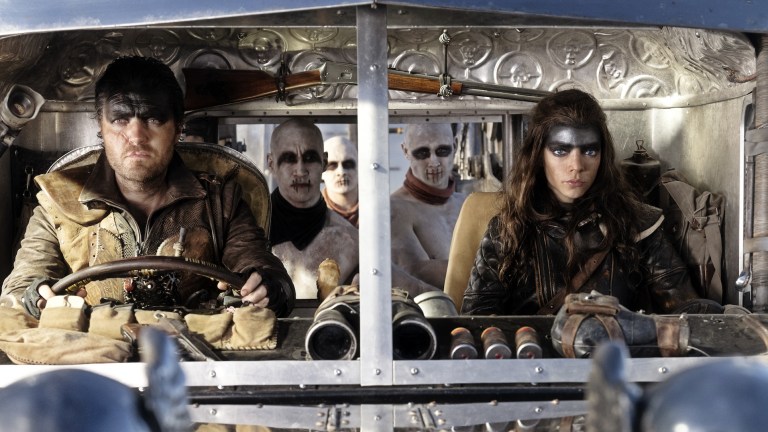How Furiosa Defeats the Unnecessary Romantic Subplot
Love in the time of the Wasteland is a dangerous game in Furiosa: A Mad Max Saga.

This article contains Furiosa: A Mad Max Saga spoilers.
Furiosa’s world is not a romantic place. George Miller’s post-apocalyptic Wasteland is barely habitable and fit for the toughest of survivors only. The young Furiosa (Alyla Browne) must learn this fast in Furiosa: A Mad Max Saga when she is snatched from her idyllic home. Her mother tries desperately to rescue her and very nearly manages but instead is caught, tortured, and killed by Dementusm (Chris Hemsworth) and his men in front of her daughter. Dementus wants to know where Furiosa’s home is. But Furiosa knows she can’t tell him, even if it means watching the person she loves most in the world burned, maimed, and murdered. That is what love gets you: vulnerability and pain. And so the young Furiosa becomes the property of Dementus, and is later bartered to Immortan Joe (Lachy Hulme) who is less bothered about trying to torture the location of her home from her (perhaps knowing it won’t work) and more interested in adding her to his small harem of healthy women who might provide him and his sons with heirs. Like we said: no romance.
But Miller’s wonderful prequel plays with the residual humanity (where there is some) of those left alive and allows Furiosa a glimpse of… if not love or romance, then perhaps just compassion and connection. It’s shrewd, important, poignant, and a million miles from the unnecessary movie romance subplot trope. Think Claire and Owen in Jurassic World, Tauriel and Kili in The Hobbit films, or, I would argue, Steve and Diana in the Wonder Woman movies.
This is not that. Furiosa’s “love interest”—which is really not the right word—is Praetorian Jack (Tom Burke, from Strike and The Lazarus Project), a sexy truck driver charged with making Immortan Joe’s deliveries to the rival factions of the Wasteland. It’s a dangerous job that Jack is good at, though his motorcade of War Boys don’t always fare so well. Furiosa, now grown into Anya Taylor-Joy, is a stow away, hiding under the massive suped-up gas truck she’d help build (disguised as a boy). When rogue mercenaries attack the truck, Furiosa goes into action mode to save the day, not out of any loyalty to Immortan Joe but out of pure practicality—she wants to take the truck to get her home. Left as the last two survivors, Furiosa threatens Jack and tries to hijack the truck. Instead he boots her out and leaves her on the road with nothing.
Except he doesn’t. He shows her compassion. He waits for her. Promises to help her get skilled up, tooled up, get a vehicle. He wants her to help him finish his deliveries. It makes sense for both of them. Subtle shorthand shows us that they travel together for some time; she takes on his face paint style, he gets her a “boomstick.” When Jack gets ambushed at the bullet farm and Furiosa has the means and opportunity to escape and find her way home, she chooses not to, and risks her life to save his. When she first invites him to come with her to her home, he turns her down. Later he agrees. Their friendship/romance is slow, sincere, and earned.
Furiosa and Jack’s relationship isn’t about lust or sex. And the concept of “love” is never discussed, because who has the time or space for either of these concepts in the Wasteland?
Furiosa, as a movie, is pleasingly, and perhaps surprisingly, sexless. We know the brides are being raped with a view to produce babies, and when those babies aren’t viable, the mothers are used for their milk. It’s a horrible image but it’s not as basely lusty as some dystopias.
So Furiosa and Jack’s closeness is particularly delicate and poignant. The closest they get physically is to touch foreheads, and for her to lean her head on his shoulder in the face of certain death. It’s beautiful and meaningful. Dementus knows it, and can’t bear to look at it. He is a man with no hope and no humanity, and for him to see this tenderness enrages him. And so he destroys it with unreserved cruelty, forcing Furiosa to watch as Praetorian Jack is dragged around and around behind a bike until Jack is dead and Dementus is bored. He craved more and more cruelty until it’s never enough, as he explains to Furiosa, suggesting that they are the same. They are not the same. Furiosa has cut her own arm off to escape, but also, we wonder, not to have to watch Jack die.
The reprieve the audience is given, is that we don’t see him die either. It would be too cruel, and Jack should not become Furiosa’s “woman in the fridge.” Instead we understand he is gone, and Furiosa must move on. Has her love for him made her weaker? We think it’s quite the opposite, but her suffering must be all the more acute for allowing herself to care.
It’s important to note that this care that she feels does not make her “safe.” Miller takes pains to make it so. Much has been written about Ripley in Alien, who is never “made safe” by having a love interest or a child. This happens in Aliens with Newt, and in Alien 3 with Clemens, which arguably makes her a slightly less interesting character. Though Furiosa’s look invites comparisons to Ripley, that is not what happens to Furiosa—if anything she is more dangerous for having allowed compassion into her life, and lost it only to fight another day. If she’s not giving up her home location as a young child for the sake of her mother’s life, no man could make her safe.
Therefore when Furiosa returns to the Citadel to take up her role as one of Immortan Joe’s fiercest warriors, and introduces herself as Praetorian Furiosa, it’s not as a woman who has taken her husband’s name but as unstoppable force who now identifies with his tribe. Her priority is no longer to find her home at all costs, and the particular revenge she takes on Dementus is an indicator of that. The Citadel is her home now, for a while at least, until she can help free the five brides. Far from being an unnecessary subplot, her relationship with Jack is a part of Furiosa and one of the most delicately woven elements of the film.
Furiosa is in cinemas now.
